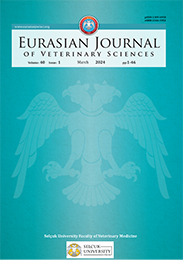| 2013, Cilt 29, Sayı 3, Sayfa(lar) 133-137 |
| [ Türkçe Özet ] [ PDF ] [ Benzer Makaleler ] |
| The role of dietary bee pollen in antioxidant potential in rats |
| Marcela Capcarova1, Adriana Kolesarova1, Anna Kalafova1, Branislav Galik2, Milan Simko2, Miroslav Juracek2, Robert Toman3 |
| 1Department of Animal Physiology, Faculty of Biotechnology and Food Sciences, Slovak University of Agriculture in Nitra, Tr. A. Hlinku Nitra, Slovak Republic 2Department of Animal Nutrition, Faculty of Agrobiology and Food Resources, Slovak University of Agriculture in Nitra, Tr. A. Hlinku Nitra, Slovak Republic 3Department of Veterinary Disciplines, Faculty of Agrobiology and Food Resources, Slovak University of Agriculture in Nitra, Tr. A. Hlinku Nitra, Slovak Republic |
| Keywords: Bee pollen, antioxidants, blood |
| Downloaded:1534 - Viewed: 2395 |
|
Aim: The present study was designed to determinate
the effect of bee pollen as a feed additive on the selected
parameters of antioxidant status of rats.
Material and Methods: Adult Wistar rats were randomly divided into 3 groups: One control group (C) and two experimental groups (E1, E2). Experimental groups received dietary inclusion of collected bee pollen at 300 mg/kg in E1 group and 500 mg/kg in E2 group for 90 days. The group received feed without bee pollen addition served as the control group. Contents of albumin, bilirubin, iron, and total antioxidant status and superoxide dismutase activity were determined with spectrophotometer. Results: Supplementation of the diet with bee pollen in the dose of 500 mg/kg significantly (P<0.05) increased albumin content and total antioxidant status. Conclusion: Bee pollen addition to diets may be a source for antioxidant in human and animals. |
| [ Türkçe Özet ] [ PDF ] [ Benzer Makaleler ] |




